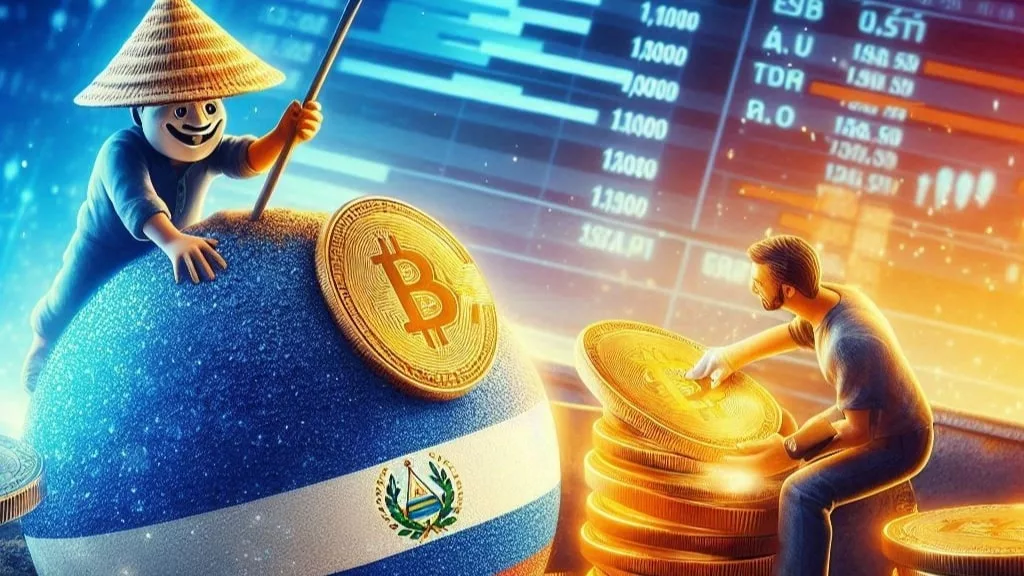
El Salvador, the first country in the world to officially adopt Bitcoin as legal tender, continues to acquire Bitcoin despite its agreement with the International Monetary Fund (IMF) to halt government accumulation. Recent blockchain data from the country’s Bitcoin Office shows that El Salvador’s treasury acquired 7 Bitcoin worth over $650,000 in the week leading up to April 27.
Rodrigo Valdes, the director of the Western Hemisphere Department at the IMF, commented on El Salvador’s Bitcoin holdings, confirming that the country is adhering to the IMF’s directive of halting government Bitcoin accumulation. Valdes made the statement during a press briefing on April 26, stating, “They continue to comply with their commitment of non-accumulation of Bitcoin by the overall fiscal sector,” which is part of the performance criteria set forth in their agreement.
While the IMF agreement stipulates that El Salvador must cease government Bitcoin accumulation, Valdes emphasized that the country’s focus extends beyond Bitcoin. He noted that the deal includes comprehensive reforms aimed at governance and transparency, which are the key elements of the program.
In December 2024, El Salvador struck a deal with the IMF for a $1.4 billion loan. As part of the agreement, El Salvador agreed to stop Bitcoin from being recognized as legal tender and ceased its accumulation of Bitcoin by the government.
Non-Governmental Bitcoin Accumulation Still Possible
Despite the IMF’s firm stance on halting government acquisitions of Bitcoin, industry experts believe that the agreement leaves room for Bitcoin purchases through non-governmental entities. Anndy Lian, a blockchain adviser and author, explained that the IMF’s agreement allows for a “flexible interpretation.” He suggested that the purchases could involve private entities or reclassified assets, allowing the country to remain technically compliant with the IMF’s conditions while still acquiring Bitcoin in some form.
Lian further remarked, “This alternative approach enables El Salvador to preserve its Bitcoin-friendly image while securing the critical IMF funding necessary to address the country’s unsustainable public debt and limited reserves.” This flexibility could help El Salvador maintain its support for Bitcoin and its role in the global cryptocurrency space, even as it navigates the pressures of international financial agreements.
Balancing Financial Innovation with Economic Policy
El Salvador’s situation represents a delicate balancing act between financial innovation and traditional economic policies. The country’s decision to adopt Bitcoin as legal tender was a groundbreaking move, but it also brought significant challenges, especially when dealing with international financial institutions like the IMF.
Lian pointed out that El Salvador’s approach serves as an important lesson for other nations considering cryptocurrency adoption. He emphasized the need for robust regulatory frameworks and strong state capacity to handle the complex dynamics between digital currencies and international financial pressures.
El Salvador’s experience underscores the tension between embracing financial innovation and adhering to the conventional economic policies required for securing loans and maintaining fiscal stability. While Bitcoin has been touted as a tool for financial independence, the country’s reliance on international loans demonstrates the challenges that come with integrating a decentralized currency into traditional financial systems.
The Future of Bitcoin in El Salvador
Looking ahead, the future of Bitcoin in El Salvador remains uncertain. While the government is complying with the IMF’s agreement, the nation’s continued interest in Bitcoin is clear. The treasury’s recent purchases highlight the country’s ongoing commitment to the cryptocurrency, even as it navigates the complexities of its IMF deal.
El Salvador’s experience may influence other countries considering Bitcoin adoption or other forms of cryptocurrency regulation. It provides valuable insights into the challenges that nations face when balancing digital currency innovation with traditional financial systems and international obligations. Whether El Salvador can continue acquiring Bitcoin through non-governmental means or will face further constraints remains to be seen, but the nation’s strategy could shape the future of cryptocurrency adoption on a global scale.




Get the latest Crypto & Blockchain News in your inbox.